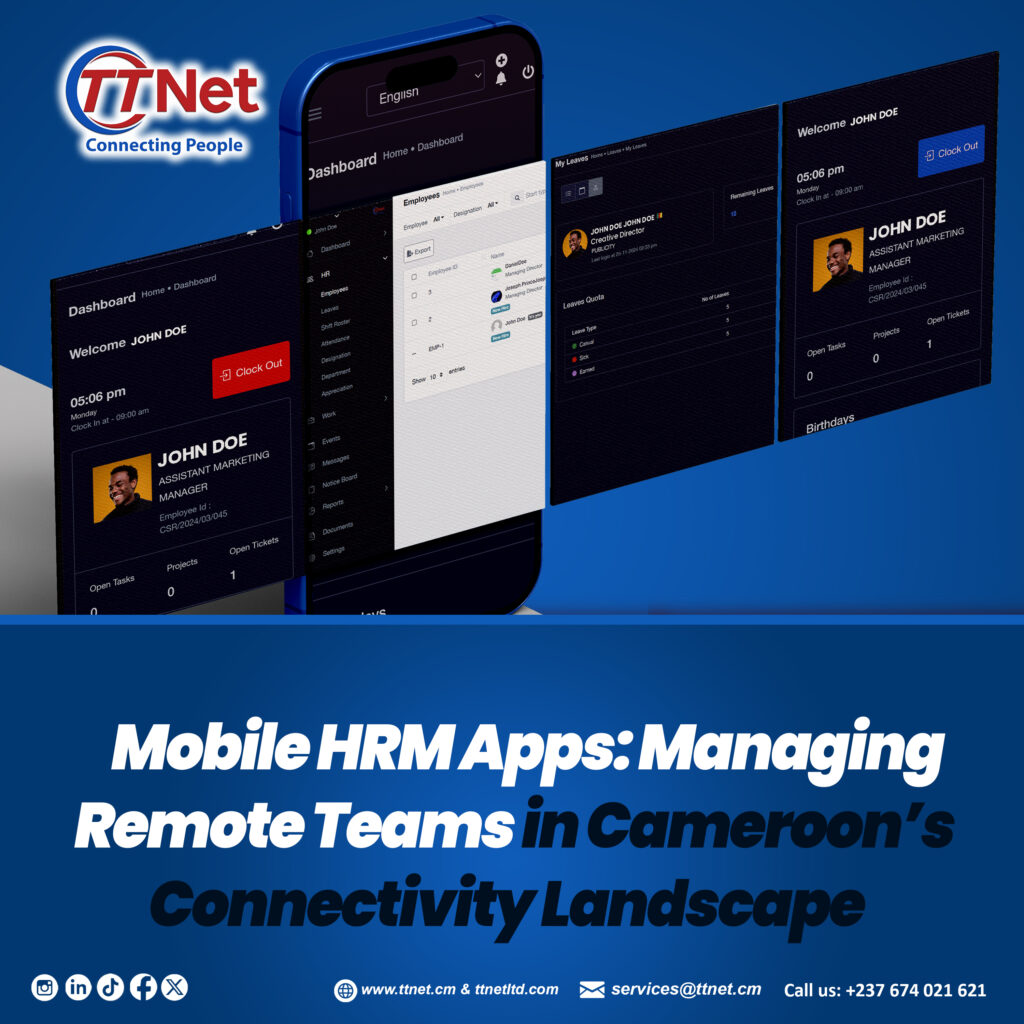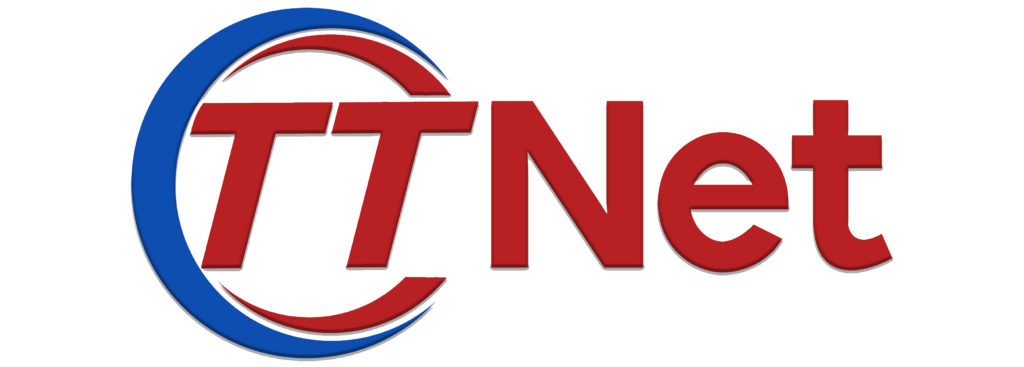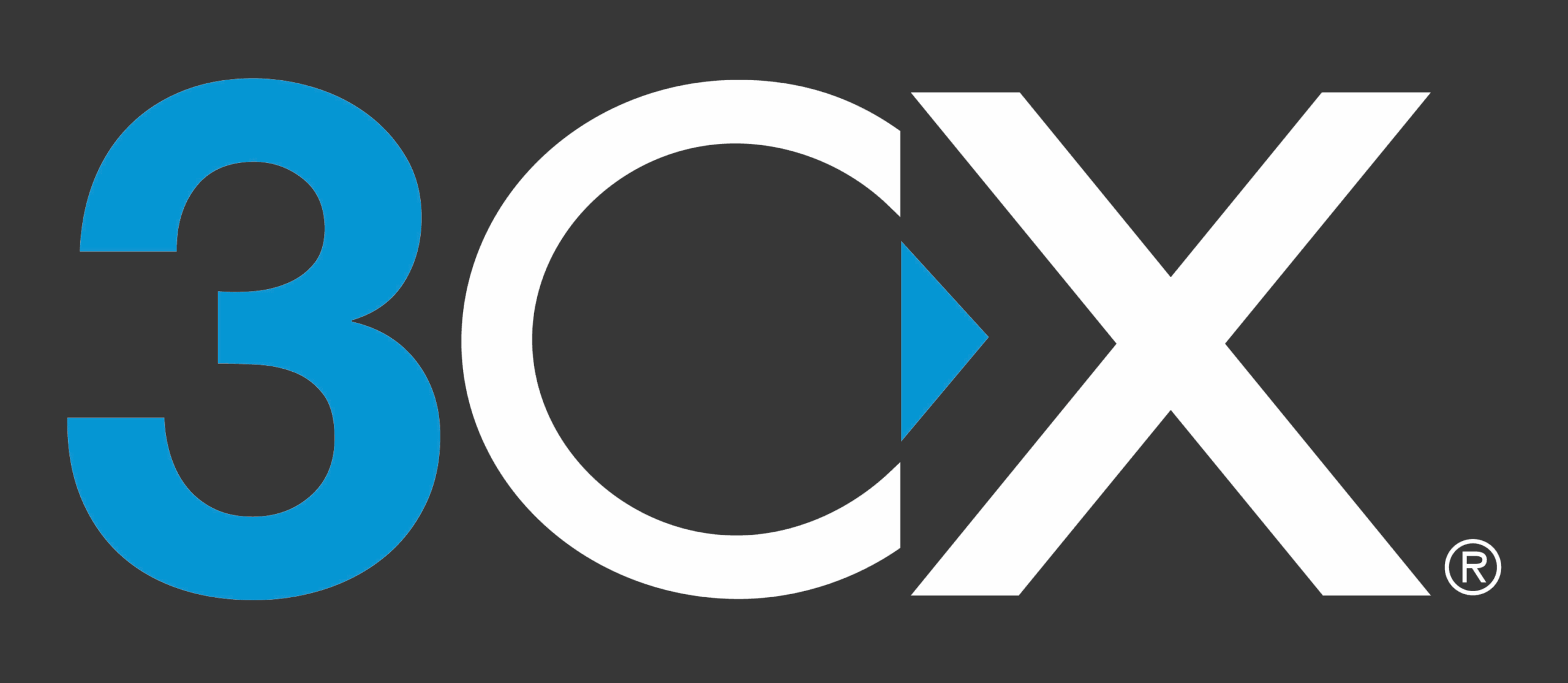
In recent years, remote work has transitioned from a niche trend to a global necessity. For businesses in Cameroon, this shift presents unique opportunities and challenges. With a growing tech-savvy workforce and increasing mobile penetration, companies are turning to mobile Human Resource Management (HRM) apps to streamline operations, enhance productivity, and bridge gaps in connectivity. Among these solutions, TTNet HRM/CRM stands out as a tailored platform designed to navigate Cameroon’s connectivity landscape while empowering businesses to manage remote teams effectively.
This blog post explores the role of mobile HRM apps in Cameroon’s evolving work environment, the challenges posed by inconsistent connectivity, and how platforms like TTNet HRM/CRM are transforming remote team management.
Cameroon’s Connectivity Landscape: Opportunities and Barriers
Cameroon, like many African nations, is experiencing a digital revolution. Mobile phone penetration has surged, with over 80% of the population using mobile devices. However, internet connectivity remains uneven. Urban centers like Douala and Yaoundé enjoy relatively stable 4G networks, while rural areas often grapple with slow speeds, limited coverage, and frequent outages.
Key factors shaping Cameroon’s connectivity include:
1. Infrastructure Gaps: Fiber-optic networks are concentrated in cities, leaving rural regions reliant on satellite or outdated infrastructure.
2. Affordability: Data costs, though decreasing, remain a barrier for low-income workers.
3. Power Instability: Frequent electricity outages force reliance on mobile data, draining batteries and limiting productivity.
For businesses managing remote teams, these challenges demand tools that function seamlessly in low-bandwidth environments while minimizing data consumption. This is where mobile HRM apps like TTNet HRM/CRM come into play.
The Rise of Remote Work in Cameroon
The COVID-19 pandemic accelerated remote work adoption in Cameroon, but its benefits, reduced overhead costs, access to a broader talent pool, and flexibility, have cemented it as a long-term strategy. Industries like tech, education, and customer service now rely heavily on distributed teams.
However, managing remote employees in Cameroon requires overcoming hurdles such as:
– Communication Gaps: Time zone differences and language barriers (French/English) complicate collaboration.
– Performance Tracking: Supervising productivity without micromanaging.
– Payroll Compliance: Navigating Cameroon’s labor laws for remote contractors.
– Employee Engagement: Maintaining morale and cohesion in dispersed teams.
Traditional HR systems, often desktop-based or reliant on high-speed internet, struggle in this context. Mobile-first HRM apps, optimized for Cameroon’s connectivity constraints, offer a viable alternative.
Why Mobile HRM Apps Are a Game-Changer
Mobile HRM apps are designed to operate efficiently on smartphones, making them accessible to employees even in areas with spotty internet. They centralize HR functions, attendance tracking, payroll, performance reviews, and communication, into a single platform. Here’s how they address Cameroon-specific challenges:
1. Offline Functionality for Unstable Networks
Apps like TTNet HRM/CRM allow users to input data offline (e.g., clocking in/out, submitting reports), which syncs automatically once connectivity resumes. This ensures uninterrupted workflows, even in rural areas.
2. Low Data Consumption
By compressing data and using lightweight interfaces, these apps reduce reliance on expensive mobile data plans, a critical feature for cost-conscious teams.
3. Real-Time Communication Tools
Integrated chat, video conferencing, and notification systems keep teams aligned without requiring third-party apps like Zoom or WhatsApp, which may consume more data.
4. Automated Compliance and Payroll
Cameroon’s labor laws mandate strict guidelines for contracts, taxes, and social security. Mobile HRM apps automate payroll calculations and tax deductions, minimizing errors and ensuring compliance.
5. Employee Self-Service Portals
Workers can access payslips, request leave, or update personal details via their phones, reducing administrative bottlenecks.
TTNet HRM/CRM: Built for Cameroon’s Needs
TTNet HRM/CRM is a locally developed platform that combines HRM and Customer Relationship Management (CRM) tools, making it uniquely suited to Cameroon’s business environment. Here’s how it stands out:
Key Features
– Multi-Platform Accessibility: Works on Android, iOS, and basic feature phones via USSD codes, ensuring inclusivity.
– Bandwidth Optimization: Uses minimal data for syncing and updates.
– Localized Compliance: Pre-configured templates align with Cameroonian labor laws.
– CRM Integration: Businesses can manage client interactions and employee workflows in one app, ideal for SMEs juggling multiple roles.
– Security: End-to-end encryption protects sensitive employee and client data.
Use Cases for Remote Teams
– Attendance Tracking: Geolocation tags and offline clock-ins prevent time theft.
– Performance Analytics: Managers monitor KPIs via dashboards, even with intermittent internet.
– Training Modules: Upload bite-sized training videos accessible on low-bandwidth connections.
– Payroll Automation: Generate and disburse salaries directly to mobile money accounts (e.g., MTN Mobile Money, Orange Money).
Best Practices for Implementing Mobile HRM Apps in Cameroon
To maximize the benefits of platforms like TTNet HRM/CRM, businesses should adopt the following strategies:
1. Assess Connectivity Needs: Identify regions where employees work and choose apps with offline capabilities.
2. Train Teams Proactively: Provide tutorials in French and English to bridge digital literacy gaps.
3. Leverage Mobile Money Integration: Simplify payroll with Cameroon’s widely used mobile payment systems.
4. Prioritize Data Security: Ensure apps comply with Cameroon’s data protection regulations.
5. Start Small: Pilot the app with a department before company-wide rollout.
The Future of Remote Work in Cameroon
As Cameroon’s digital infrastructure improves, mobile HRM apps will play an even greater role in shaping the future of work. Innovations like 5G expansion, solar-powered mobile hubs, and government-led broadband initiatives promise to enhance connectivity. Meanwhile, platforms like TTNet HRM/CRM will continue evolving, integrating AI-driven analytics and predictive tools to further streamline HR processes.
For businesses, the message is clear: Adopting mobile HRM solutions isn’t just about keeping up with trends, it’s about future-proofing operations in a country where connectivity challenges and remote work are here to stay.
Conclusion
Cameroon’s connectivity landscape may be complex, but it’s no longer a barrier to effective remote team management. Mobile HRM apps like TTNet HRM/CRM are bridging gaps, offering robust solutions tailored to local challenges. By automating HR tasks, enhancing communication, and operating efficiently in low-bandwidth environments, these tools empower businesses to thrive in a decentralized work era.
For Cameroonian companies, the time to embrace mobile HRM is now. Whether you’re a startup in Buea or an enterprise in Douala, leveraging these technologies will not only boost productivity but also position your business at the forefront of Cameroon’s digital transformation.
Ready to streamline your remote team management? Explore how TTNet HRM/CRM can transform your HR workflows, visit ttnetltd.com to start your free trial today.


